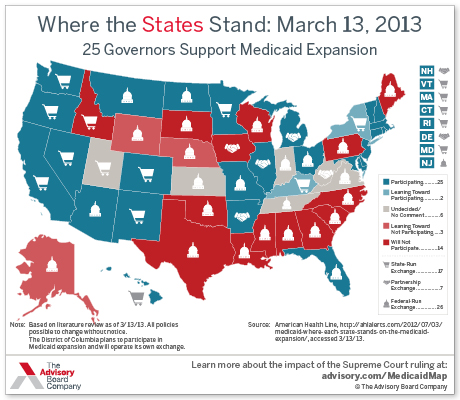Media
Medicaid Expansion Deals Don’t Deliver
 Time is ticking for President Obama to get more buy-in on a pivotal part of Obamacare—Medicaid expansion. States are under immense pressure to accept an influx of federal funds in exchange for significant new state burdens. And yet only 25 Governors have agreed to expand, leading the desperate federal government to come to the bargaining table and entertain a modified version of the Medicaid expansion.
Time is ticking for President Obama to get more buy-in on a pivotal part of Obamacare—Medicaid expansion. States are under immense pressure to accept an influx of federal funds in exchange for significant new state burdens. And yet only 25 Governors have agreed to expand, leading the desperate federal government to come to the bargaining table and entertain a modified version of the Medicaid expansion.
This modification or “third option” surfaced in Arkansas, where Governor Beebe worked out a deal with Health and Human Services Secretary Kathleen Sebelius to place the new expansion population into private insurance. Arkansas would put new enrollees in the health care exchanges rather than adding them to traditional Medicaid plans. The federal government (i.e. taxpayers) and the state would pay for the premiums for those individuals.
This is a bad deal for Medicaid patients and taxpayers since the exchange is a far cry from a free market (HT Michael Cannon):
- The Arkansas plan is more expensive. Officials estimate the plan will cost taxpayers 13 to 14 percent more than regular expansion, but no one really knows the true cost. The Congressional Budget Office estimates it will cost an additional $3,000 per enrollee.
- The plan was already rejected by Democrats. Congressional Democrats rejected this private option back in 2009 when Affordable Care Act was being drafted because it was too expensive.
- The plan entrenches Obamacare. An Arkansas-style compromise will bolster the yet-to-be created exchanges and raise premiums for all participants, since the Medicaid population tends to be sicker.
- The plan will reduce employer-provided coverage. This private option plan will encourage more employers to drop coverage since they know their employees will have access to private insurance on the exchange versus sub-par government coverage.
Placing poor families into a non-existent program isn’t much better than putting them in a broken system. We have the ability to improve the quality of Medicaid for current enrollees and reduce the cost of insurance for every Pennsylvanian through patient-centered reform.
Governor Corbett should be extremely wary of any deal with Secretary Sebelius, given the Obama administration’s unwillingness to allow the states true flexibility despite governors’ repeated requests.
The only option worth pursuing is full state flexibility over the Medicaid program—granting Medicaid beneficiaries real choices and control over their health care instead of the one-size-fits-all plan.